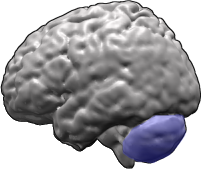Spinocerebellar ataxia
(Redirected from Ophthalmoplegia ataxia hypoacusis)
Editor-In-Chief: Prab R Tumpati, MD
Obesity, Sleep & Internal medicine
Founder, WikiMD Wellnesspedia &
W8MD medical weight loss NYC and sleep center NYC
| Spinocerebellar ataxia | |
|---|---|

| |
| Synonyms | N/A |
| Pronounce | N/A |
| Specialty | N/A |
| Symptoms | Ataxia, dysarthria, dysphagia, nystagmus, tremor |
| Complications | N/A |
| Onset | Typically adulthood |
| Duration | Chronic |
| Types | N/A |
| Causes | Genetic mutation |
| Risks | Family history |
| Diagnosis | Genetic testing, neurological examination |
| Differential diagnosis | Multiple sclerosis, Friedreich's ataxia, ataxia-telangiectasia |
| Prevention | N/A |
| Treatment | Physical therapy, occupational therapy, speech therapy |
| Medication | N/A |
| Prognosis | Progressive |
| Frequency | Rare |
| Deaths | N/A |
Spinocerebellar ataxia (SCA) is a term referring to a group of hereditary ataxias that are characterized by degenerative changes in the part of the brain related to the control of movement (cerebellum) and sometimes in the spinal cord.
Symptoms[edit | edit source]
The symptoms of spinocerebellar ataxia can vary widely depending on the specific type. However, most types of SCA share certain common symptoms. These include:
- Ataxia, or lack of muscle coordination, which may affect the patient's gait, balance, speech, or eye movements.
- Dysarthria, or difficulty speaking, which may manifest as slurred or slow speech.
- Dysphagia, or difficulty swallowing.
- Nystagmus, or involuntary eye movement.
- Neuropathy, or damage to the peripheral nerves, which can cause numbness or weakness in the limbs.
Causes[edit | edit source]
Spinocerebellar ataxias are caused by mutations in specific genes. These mutations are usually inherited in an autosomal dominant manner, meaning that an affected person has a 50% chance of passing the disorder to each of their children.
Diagnosis[edit | edit source]
Diagnosis of spinocerebellar ataxia is based on clinical observation of symptoms, a detailed patient history, and genetic testing to identify the specific mutation causing the disease.
Treatment[edit | edit source]
There is currently no cure for spinocerebellar ataxia. Treatment is focused on managing symptoms and improving quality of life. This may include physical therapy, speech therapy, and medication to control symptoms such as tremors or muscle stiffness.
See also[edit | edit source]
References[edit | edit source]
Transform your life with W8MD's budget GLP1 injections from $125
W8MD offers a medical weight loss program NYC and a clinic to lose weight in Philadelphia. Our W8MD's physician supervised medical weight loss centers in NYC provides expert medical guidance, and offers telemedicine options for convenience.
Why choose W8MD?
- Comprehensive care with FDA-approved weight loss medications including:
- loss injections in NYC both generic and brand names:
- weight loss medications including Phentermine, Qsymia, Diethylpropion etc.
- Accept most insurances for visits or discounted self pay cost.
- Generic weight loss injections starting from just $125.00 for the starting dose
- In person weight loss NYC and telemedicine medical weight loss options in New York city available
- Budget GLP1 weight loss injections in NYC starting from $125.00 biweekly with insurance!
Book Your Appointment
Start your NYC weight loss journey today at our NYC medical weight loss, and Philadelphia medical weight loss Call (718)946-5500 for NY and 215 676 2334 for PA
Search WikiMD
Ad.Tired of being Overweight? Try W8MD's NYC physician weight loss.
Semaglutide (Ozempic / Wegovy and Tirzepatide (Mounjaro / Zepbound) available. Call 718 946 5500.
Advertise on WikiMD
|
WikiMD's Wellness Encyclopedia |
| Let Food Be Thy Medicine Medicine Thy Food - Hippocrates |
Translate this page: - East Asian
中文,
日本,
한국어,
South Asian
हिन्दी,
தமிழ்,
తెలుగు,
Urdu,
ಕನ್ನಡ,
Southeast Asian
Indonesian,
Vietnamese,
Thai,
မြန်မာဘာသာ,
বাংলা
European
español,
Deutsch,
français,
Greek,
português do Brasil,
polski,
română,
русский,
Nederlands,
norsk,
svenska,
suomi,
Italian
Middle Eastern & African
عربى,
Turkish,
Persian,
Hebrew,
Afrikaans,
isiZulu,
Kiswahili,
Other
Bulgarian,
Hungarian,
Czech,
Swedish,
മലയാളം,
मराठी,
ਪੰਜਾਬੀ,
ગુજરાતી,
Portuguese,
Ukrainian
Medical Disclaimer: WikiMD is not a substitute for professional medical advice. The information on WikiMD is provided as an information resource only, may be incorrect, outdated or misleading, and is not to be used or relied on for any diagnostic or treatment purposes. Please consult your health care provider before making any healthcare decisions or for guidance about a specific medical condition. WikiMD expressly disclaims responsibility, and shall have no liability, for any damages, loss, injury, or liability whatsoever suffered as a result of your reliance on the information contained in this site. By visiting this site you agree to the foregoing terms and conditions, which may from time to time be changed or supplemented by WikiMD. If you do not agree to the foregoing terms and conditions, you should not enter or use this site. See full disclaimer.
Credits:Most images are courtesy of Wikimedia commons, and templates, categories Wikipedia, licensed under CC BY SA or similar.
Contributors: Prab R. Tumpati, MD




